★★½
“More is less.”
 I was quite surprised to hear about Amazon taking up Joe Wright’s 2011 movie of the same name, and turning it into a TV series. There didn’t seem to be an enormous amount of point: the film was perfectly self-contained as it was, and didn’t appear to need expansion. Having now watched the eight 50-minute episodes from the first season… I’m still not sure of the point.
I was quite surprised to hear about Amazon taking up Joe Wright’s 2011 movie of the same name, and turning it into a TV series. There didn’t seem to be an enormous amount of point: the film was perfectly self-contained as it was, and didn’t appear to need expansion. Having now watched the eight 50-minute episodes from the first season… I’m still not sure of the point.
The first three are more or less a stretched-out version of the original movie, beginning with Hanna (Creed-Miles) and her adoptive father Erik Heller (Kinnaman) living completely off the grid in the middle of a European forest. They are re-located by the CIA black operation which had attempted to turn Hanna into a super-soldier, under the control of Marissa Wiegler (Enos – amusing to see her and Kinnaman on opposite sides, since they were partners on the American remake of The Killing), and from which Erick had freed her. Hanna is kidnapped, and taken to a secure facility, though escapes and has to make her way across Europe, solo, in order to be re-united with her father.
So far, so adequate, though the knock-off Chemical Brothers electro-noodly score served mostly to remind me of how good the original was, and we could certainly have used more of Hanna in action. It’s in the middle section that this completely loses its way. If you’ve seen the film, you’ll know on her trans-continental journey, the heroine is befriended by a British family and their daughter, Sophie (Barretto). Here after they part ways, Hanna takes a detour to Britain, hangs out with Sophie, and spends the middle episodes being a teenager, with all the annoying brattiness that entails. Was there anyone who wanted to see this? Certainly not me, and this very nearly went into the “Did not finish” pile as a result, because it’s extremely annoying.
The series does somewhat redeem itself over the final couple of episodes. We discover that the project from which Hanna was spawned, is still operating – and this comes as much of a shock to Marissa as anyone. Hanna and Erik head towards the complex which houses it, with the aim of liberating all the other proto-Hannas, pursued both by Wiegler and the combined forces of the military-industrial complex. However, not everyone necessarily wants to be rescued… The series ends on an open note, and Amazon recently announced there will be a second season. To be honest, you couls get caught up by skipping the first six episodes entirely, and just watching the movie, then parts 7-8.
The series does fill in much more of Hanna’s back-story, in particular how she became part of the project, and I also did like the way Wiegler’s position shifts over the course of the show. It will be interesting to see where she goes in the next season, since her position is now little less precarious than Hanna’s [and as we see at one point, Marissa has some skills of her own!]. On that basis, I’m not prepared to write this off yet, since it will now have to find fresh earth to till. Hopefully Farr does a better job there with original ideas, than of transforming his own work for the small screen.
Creator: David Farr
Star: Esme Creed-Miles, Joel Kinnaman, Mireille Enos, Rhianne Barreto





 Marginally competent, and just not very exciting, this low-budget offering is the story of December (Kurishingal). As a young girl, she watched as the rest of her family was slaughtered by Law (Ramsey) and his villains, the result of a debt owed by her father. A decade or so late, she has grown up and taken to the streets as a vigilante, seeking vengeance on those responsible. Or, until she finds them, any other perpetrators she comes across during her night-time ramblings through the mean back alleys of the city. Helping her mission, is that she now works for the police, which puts her in a prime position to ensure, for example, that any evidence pointing in her direction goes “missing”.
Marginally competent, and just not very exciting, this low-budget offering is the story of December (Kurishingal). As a young girl, she watched as the rest of her family was slaughtered by Law (Ramsey) and his villains, the result of a debt owed by her father. A decade or so late, she has grown up and taken to the streets as a vigilante, seeking vengeance on those responsible. Or, until she finds them, any other perpetrators she comes across during her night-time ramblings through the mean back alleys of the city. Helping her mission, is that she now works for the police, which puts her in a prime position to ensure, for example, that any evidence pointing in her direction goes “missing”.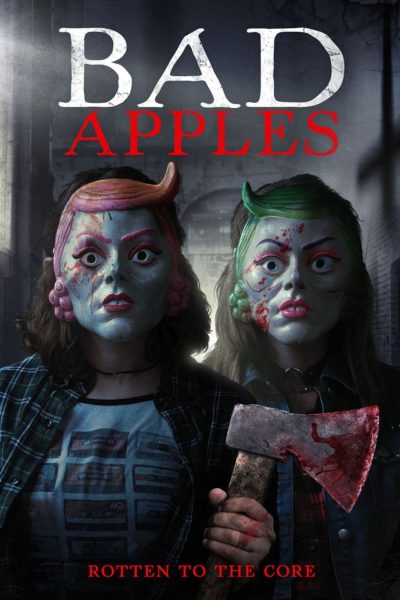 Ineptly constructed on just about every level, this proves that stealing from better movies – most obviously, Halloween and The Strangers – is not a guaranteed recipe for success. Teacher Ella (Grant) is has just moved into a new home with her husband, Robert (Skipper), who works at the local hospital. Left alone in the house on Halloween night – that whirring sounds are my eyes rolling – Ella becomes the target for two young girls (Prichard + Collins) in masks, whose unfortunate pre-natal experience has apparently left them with severely psychotic tendencies. Or so we are left to presume, for the bulk of what follows.
Ineptly constructed on just about every level, this proves that stealing from better movies – most obviously, Halloween and The Strangers – is not a guaranteed recipe for success. Teacher Ella (Grant) is has just moved into a new home with her husband, Robert (Skipper), who works at the local hospital. Left alone in the house on Halloween night – that whirring sounds are my eyes rolling – Ella becomes the target for two young girls (Prichard + Collins) in masks, whose unfortunate pre-natal experience has apparently left them with severely psychotic tendencies. Or so we are left to presume, for the bulk of what follows. I could have sworn I’d seen this before, to the point where I almost skipped over it on Amazon Prime. But on checking, appears not. Did I watch it, and just not review it? Or does it only
I could have sworn I’d seen this before, to the point where I almost skipped over it on Amazon Prime. But on checking, appears not. Did I watch it, and just not review it? Or does it only 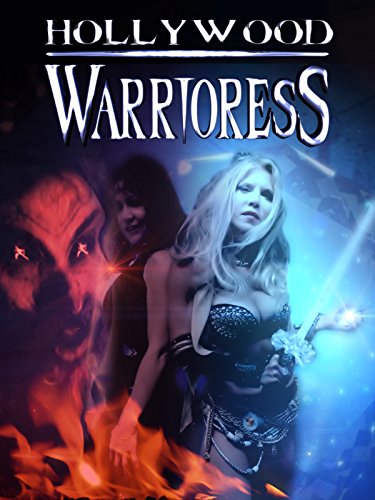 The IMDb says this is a 2016 movie. The copyright in the end credits says 2014. But shooting was apparently going on for this at least as far back as 2011, according to Internet reports. I suspect a lengthy production, shot on weekends, when the participants have some spare time, which may well explain the presence of
The IMDb says this is a 2016 movie. The copyright in the end credits says 2014. But shooting was apparently going on for this at least as far back as 2011, according to Internet reports. I suspect a lengthy production, shot on weekends, when the participants have some spare time, which may well explain the presence of 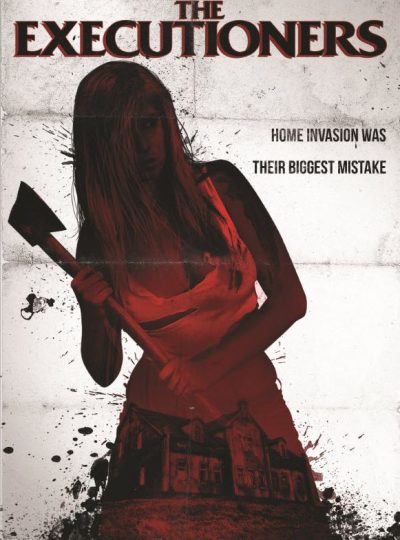 “I realized that there was no such thing as a boundary between good or evil, black and white, right or wrong. All I learned is that this world is divided by the executed and executioners.” The above is spoken by a character toward the end of this, and explains the significance of the title, though your mileage may vary as to how convincing it is as an explanation. Four young women go to a country house by a lake, which holds dark memories for one of them. Belle (Dallender, known here from
“I realized that there was no such thing as a boundary between good or evil, black and white, right or wrong. All I learned is that this world is divided by the executed and executioners.” The above is spoken by a character toward the end of this, and explains the significance of the title, though your mileage may vary as to how convincing it is as an explanation. Four young women go to a country house by a lake, which holds dark memories for one of them. Belle (Dallender, known here from 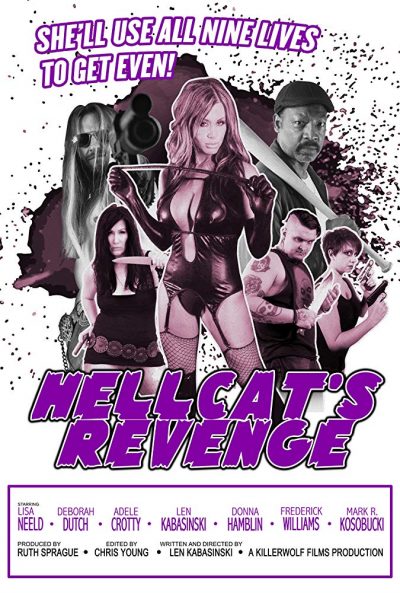 The leader of all-girl biker gang the Hellcats is brutally beaten and murdered, by Repo (Kosobucki). Her replacement, Kat (Neeld), tries to get to the bottom of the killing, and take vengeance on the perpetrators. Complicating matters is Repo’s position in the Vipers, another motorcycle club with whom the Hellcats have previously had generally friendly relations. Part of that is due to Kat’s on-again, off-again relationship with their leader, Snake (Kabasinski); he also has the advantage of being cosy with some of the local cops, who divert confiscated drugs back to the Vipers for resale. But was he aware of – or did Snake perhaps even order? – Repo’s actions?
The leader of all-girl biker gang the Hellcats is brutally beaten and murdered, by Repo (Kosobucki). Her replacement, Kat (Neeld), tries to get to the bottom of the killing, and take vengeance on the perpetrators. Complicating matters is Repo’s position in the Vipers, another motorcycle club with whom the Hellcats have previously had generally friendly relations. Part of that is due to Kat’s on-again, off-again relationship with their leader, Snake (Kabasinski); he also has the advantage of being cosy with some of the local cops, who divert confiscated drugs back to the Vipers for resale. But was he aware of – or did Snake perhaps even order? – Repo’s actions?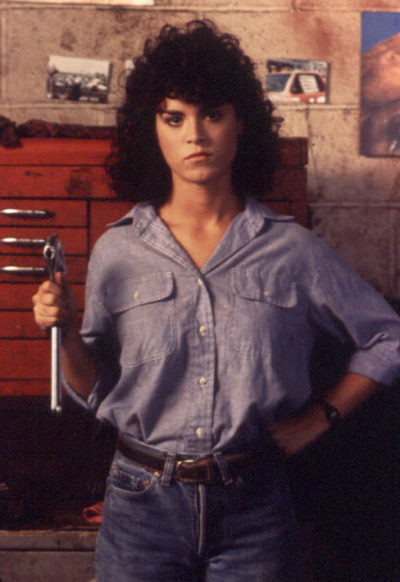 Crown International were an independent movie studio, who operated from the sixties through the eighties: we’ve covered some of their work before, such as
Crown International were an independent movie studio, who operated from the sixties through the eighties: we’ve covered some of their work before, such as  Space freighter pilot Jason (Sheridan) has his craft hijacked, and is forced to crash-land it on a deserted planet. Blinded and alone, things look grim for him, until he’s fortunate enough to be found by android Reyna (Guzzetta). She’s the product of a maverick genius, who took refuge on the planet, but recently died: she needs Jason, as the systems which power her require a human presence in order to operate. And he needs her – in particular, her advanced combat skills – in order to protect him, both from the planet’s hostile fauna, and the hijacker’s pals, who have followed him down to its surface. Yet, is Reyna entirely trustworthy?
Space freighter pilot Jason (Sheridan) has his craft hijacked, and is forced to crash-land it on a deserted planet. Blinded and alone, things look grim for him, until he’s fortunate enough to be found by android Reyna (Guzzetta). She’s the product of a maverick genius, who took refuge on the planet, but recently died: she needs Jason, as the systems which power her require a human presence in order to operate. And he needs her – in particular, her advanced combat skills – in order to protect him, both from the planet’s hostile fauna, and the hijacker’s pals, who have followed him down to its surface. Yet, is Reyna entirely trustworthy?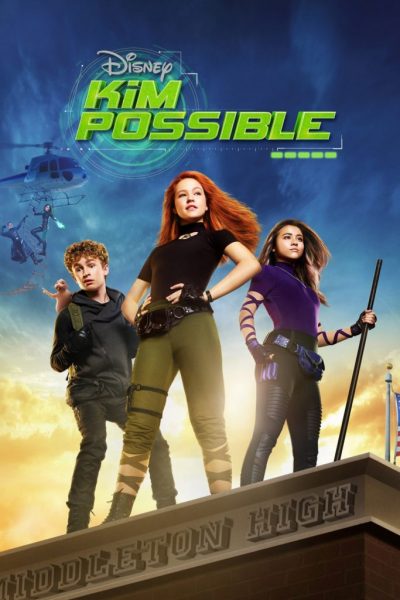 The new trend for Disney appears to be, live-action version of their beloved classic movies. This year alone, we can expect to see Dumbo, Aladdin and The Lion King, with Mulan to follow in 2020. A possible stalking horse for this was the live-action version of (somewhat) beloved TV series, Kim Possible, which ran for four seasons from 2002-07. It was pretty good, likely peaking with TV movie
The new trend for Disney appears to be, live-action version of their beloved classic movies. This year alone, we can expect to see Dumbo, Aladdin and The Lion King, with Mulan to follow in 2020. A possible stalking horse for this was the live-action version of (somewhat) beloved TV series, Kim Possible, which ran for four seasons from 2002-07. It was pretty good, likely peaking with TV movie 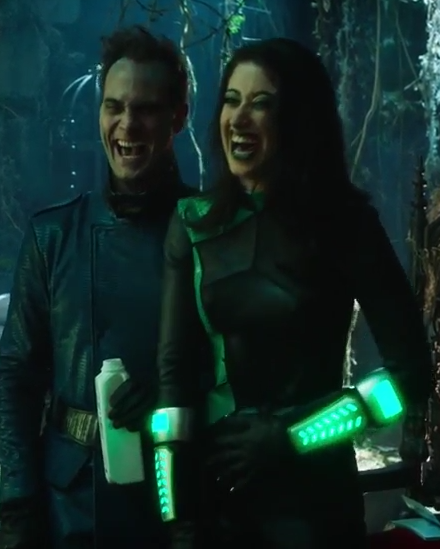 Instead, however, there’s a really horrible plot about Kim befriending Athena (Wilson), another new student. I’m sorry, when did Kim Possible become a relationship drama? Jealousy of Athena – despite her being super-annoying – causes Kim to suffer self-doubt, and fail when she is needed most… blah blah blah. Awful scripting, the portrayal of their relationship is sub-juvenile pap, which I’m sure would turn the stomach of any actual high-schooler. Worse, it goes beyond “flawed”, making the heroine weak and no longer heroic. And what’s with Kim being obsessed with joining the school’s soccer team? She was a
Instead, however, there’s a really horrible plot about Kim befriending Athena (Wilson), another new student. I’m sorry, when did Kim Possible become a relationship drama? Jealousy of Athena – despite her being super-annoying – causes Kim to suffer self-doubt, and fail when she is needed most… blah blah blah. Awful scripting, the portrayal of their relationship is sub-juvenile pap, which I’m sure would turn the stomach of any actual high-schooler. Worse, it goes beyond “flawed”, making the heroine weak and no longer heroic. And what’s with Kim being obsessed with joining the school’s soccer team? She was a